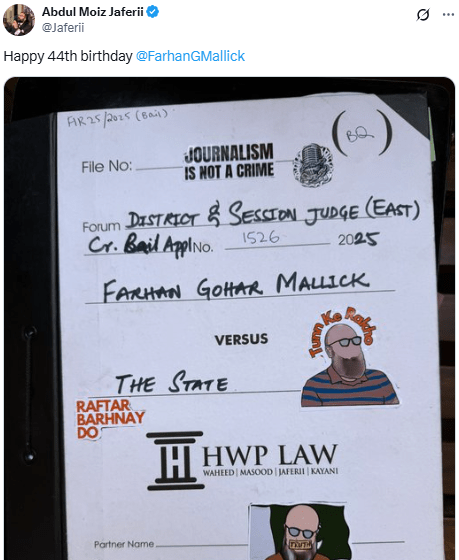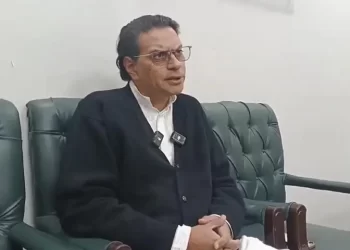Two separate Karachi courts on Monday granted bail to journalist Farhan Mallick in as many cases against him — pertaining to allegedly “anti-state” content and data theft through a call centre.
Mallick, the founder of media agency Raftar and a former news director at Samaa TV, was arrested on March 20 in Karachi and booked under the Prevention of Electronic Crimes Act (Peca) as well as the Pakistan Penal Code in a case related to alleged anti-state content on his YouTube channel.
The arrest was met with widespread criticism from media bodies as well as rights activists.
District and Sessions Judge (East) Dr Chaudhry Wasim Iqbal approved Mallick’s appeal against a judicial magistrate’s denial of bail in the “anti-state” content case, while Judicial Magistrate (Malir) Piyar Ali Khoso granted him bail in the call centre case.
width=”100%” frameborder=”0″ scrolling=”no” style=”height:250px;position:relative”
src=”
sandbox=”allow-same-origin allow-scripts allow-popups allow-modals allow-forms”>
The bails were approved against surety bonds worth Rs100,000 in each of the two cases.
The journalist’s lawyer, Abdul Moiz Jaferii, told media.com that Judge Iqbal took up the appeal against Judicial Magistrate Yusra Ashfaq’s March 28 order.
Mallick’s outlet Raftar hailed the bail in the anti-state content case as a “small victory in a long journey”.
“We are now headed to Malir Court with [the] legal team for the second hearing — keep making dua; hope and resilience keep us going,” it wrote on X.
“Happy 44th birthday Farhan Mallick,” Jaferii quipped on X after the second bail.

The appeal against the March 28 order, a copy of which is available with media.com, contended that the charges were a “fishing expedition to conjure up a case when the applicant has no nexus with the illegalities detailed therein”.
The application argued that the offence under Section-26A of Peca was not even applicable as the first information report (FIR) “utterly fails to detail any particulars of the content” allegedly shared by Mallick on Raftar.
It stressed that the law required the “presence of public dissemination or transmission of false information known by the offender to be false or likely to cause panic or disorder”. “Element of mala fide on the part of the FIA cannot be ruled out,” it added.
The bail plea in the call centre also asserted: “The entire edifice of allegations levelled against the applicant is not supported by even a speck of evidence.”
“The impugned FIR brings charges against the applicant which cannot by any stretch of imagination be attracted on vague and baseless grounds such as a bogus and hearsay statement by another co-accused, which cannot carry any weight in and of itself,” it argued.
Peca and alleged call centre cases against Mallick
Mallick was handed into the Federal Investigation Agency’s (FIA) custody for four days a day after his arrest, following which he was sent to jail on judicial remand on March 25.
The next day, the FIA was given Mallick’s five-day physical custody in a new case pertaining to his alleged involvement in the theft of credit card data through “spoofed calls”.
On March 28, Judicial Magistrate Yusra Ashfaq had dismissed the senior journalist’s bail application. An appeal challenging that order was fixed for hearing on April 3 but was postponed till today as the FIA claimed not having knowledge of the hearing.
width=”100%” frameborder=”0″ scrolling=”no” style=”height:250px;position:relative”
src=”
sandbox=”allow-same-origin allow-scripts allow-popups allow-modals allow-forms”>
According to a first information report (FIR) dated March 20, the FIA had received a report about Raftar TV’s YouTube channel, which was “involved in running a campaign for the posting of anti-state videos targeting the dignitaries mentioned in violation”.
Mallick had been booked under sections 16 (unauthorised use of identity information), 20 (offences against the dignity of a natural person) and 26-A of Peca 2016, as well as sections 500 (punishment for defamation) and 109 (abetment) of the PPC.
Notably, Section 26A is among the provisions recently added to the Peca laws, wherein fake news is defined as any information about which a person “knows or has reason to believe to be false or fake and likely to cause or create a sense of fear, panic or disorder or unrest”.
Any person found guilty of spreading such information could be sentenced to up to three years in prison or fined up to Rs2 million, or both.
The criminalisation of online disinformation has spread fear in Pakistan, with journalists among those worried about the potentially wide reach of the law.
width=”100%” frameborder=”0″ scrolling=”no” style=”height:250px;position:relative”
src=”
sandbox=”allow-same-origin allow-scripts allow-popups allow-modals allow-forms”>
According to the FIR in the second case, the FIA team had raided an alleged call centre in Gulshan-i-Iqbal, where employees (agents) were found engaged in illegal activities involving spoofed calls through Voice over Internet Protocol (VoIP) software.
They allegedly contacted foreign nationals, falsely claiming to be representatives of the security department of Master and Visa banking systems, it added.
The FIA claimed that these payments were handled by the company’s owner/partner, Hassan Najeeb Alam, while another suspect, Syed Muhammad Atir Hussain, allegedly disclosed to the FIA that these illegal activities were being carried out under the patronage of Mr Mallick.









